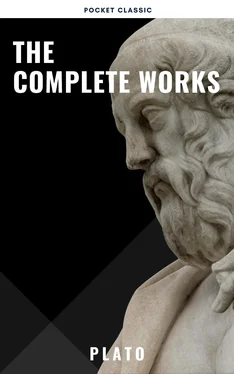EUTHYPHRO: Exactly.
SOCRATES: And of the many and fair things done by the gods, which is the chief or principal one?
EUTHYPHRO: I have told you already, Socrates, that to learn all these things accurately will be very tiresome. Let me simply say that piety or holiness is learning how to please the gods in word and deed, by prayers and sacrifices. Such piety is the salvation of families and states, just as the impious, which is unpleasing to the gods, is their ruin and destruction.
SOCRATES: I think that you could have answered in much fewer words the chief question which I asked, Euthyphro, if you had chosen. But I see plainly that you are not disposed to instruct me—clearly not: else why, when we reached the point, did you turn aside? Had you only answered me I should have truly learned of you by this time the nature of piety. Now, as the asker of a question is necessarily dependent on the answerer, whither he leads I must follow; and can only ask again, what is the pious, and what is piety? Do you mean that they are a sort of science of praying and sacrificing?
EUTHYPHRO: Yes, I do.
SOCRATES: And sacrificing is giving to the gods, and prayer is asking of the gods?
EUTHYPHRO: Yes, Socrates.
SOCRATES: Upon this view, then, piety is a science of asking and giving?
EUTHYPHRO: You understand me capitally, Socrates.
SOCRATES: Yes, my friend; the reason is that I am a votary of your science, and give my mind to it, and therefore nothing which you say will be thrown away upon me. Please then to tell me, what is the nature of this service to the gods? Do you mean that we prefer requests and give gifts to them?
EUTHYPHRO: Yes, I do.
SOCRATES: Is not the right way of asking to ask of them what we want?
EUTHYPHRO: Certainly.
SOCRATES: And the right way of giving is to give to them in return what they want of us. There would be no meaning in an art which gives to any one that which he does not want.
EUTHYPHRO: Very true, Socrates.
SOCRATES: Then piety, Euthyphro, is an art which gods and men have of doing business with one another?
EUTHYPHRO: That is an expression which you may use, if you like.
SOCRATES: But I have no particular liking for anything but the truth. I wish, however, that you would tell me what benefit accrues to the gods from our gifts. There is no doubt about what they give to us; for there is no good thing which they do not give; but how we can give any good thing to them in return is far from being equally clear. If they give everything and we give nothing, that must be an affair of business in which we have very greatly the advantage of them.
EUTHYPHRO: And do you imagine, Socrates, that any benefit accrues to the gods from our gifts?
SOCRATES: But if not, Euthyphro, what is the meaning of gifts which are conferred by us upon the gods?
EUTHYPHRO: What else, but tributes of honour; and, as I was just now saying, what pleases them?
SOCRATES: Piety, then, is pleasing to the gods, but not beneficial or dear to them?
EUTHYPHRO: I should say that nothing could be dearer.
SOCRATES: Then once more the assertion is repeated that piety is dear to the gods?
EUTHYPHRO: Certainly.
SOCRATES: And when you say this, can you wonder at your words not standing firm, but walking away? Will you accuse me of being the Daedalus who makes them walk away, not perceiving that there is another and far greater artist than Daedalus who makes them go round in a circle, and he is yourself; for the argument, as you will perceive, comes round to the same point. Were we not saying that the holy or pious was not the same with that which is loved of the gods? Have you forgotten?
EUTHYPHRO: I quite remember.
SOCRATES: And are you not saying that what is loved of the gods is holy; and is not this the same as what is dear to them—do you see?
EUTHYPHRO: True.
SOCRATES: Then either we were wrong in our former assertion; or, if we were right then, we are wrong now.
EUTHYPHRO: One of the two must be true.
SOCRATES: Then we must begin again and ask, What is piety? That is an enquiry which I shall never be weary of pursuing as far as in me lies; and I entreat you not to scorn me, but to apply your mind to the utmost, and tell me the truth. For, if any man knows, you are he; and therefore I must detain you, like Proteus, until you tell. If you had not certainly known the nature of piety and impiety, I am confident that you would never, on behalf of a serf, have charged your aged father with murder. You would not have run such a risk of doing wrong in the sight of the gods, and you would have had too much respect for the opinions of men. I am sure, therefore, that you know the nature of piety and impiety. Speak out then, my dear Euthyphro, and do not hide your knowledge.
EUTHYPHRO: Another time, Socrates; for I am in a hurry, and must go now.
SOCRATES: Alas! my companion, and will you leave me in despair? I was hoping that you would instruct me in the nature of piety and impiety; and then I might have cleared myself of Meletus and his indictment. I would have told him that I had been enlightened by Euthyphro, and had given up rash innovations and speculations, in which I indulged only through ignorance, and that now I am about to lead a better life.
PERSONS OF THE DIALOGUE:Socrates and Menexenus.
SOCRATES: Whence come you, Menexenus? Are you from the Agora?
MENEXENUS: Yes, Socrates; I have been at the Council.
SOCRATES: And what might you be doing at the Council? And yet I need hardly ask, for I see that you, believing yourself to have arrived at the end of education and of philosophy, and to have had enough of them, are mounting upwards to things higher still, and, though rather young for the post, are intending to govern us elder men, like the rest of your family, which has always provided some one who kindly took care of us.
MENEXENUS: Yes, Socrates, I shall be ready to hold office, if you allow and advise that I should, but not if you think otherwise. I went to the council chamber because I heard that the Council was about to choose some one who was to speak over the dead. For you know that there is to be a public funeral?
SOCRATES: Yes, I know. And whom did they choose?
MENEXENUS: No one; they delayed the election until tomorrow, but I believe that either Archinus or Dion will be chosen.
SOCRATES: O Menexenus! Death in battle is certainly in many respects a noble thing. The dead man gets a fine and costly funeral, although he may have been poor, and an elaborate speech is made over him by a wise man who has long ago prepared what he has to say, although he who is praised may not have been good for much. The speakers praise him for what he has done and for what he has not done—that is the beauty of them—and they steal away our souls with their embellished words; in every conceivable form they praise the city; and they praise those who died in war, and all our ancestors who went before us; and they praise ourselves also who are still alive, until I feel quite elevated by their laudations, and I stand listening to their words, Menexenus, and become enchanted by them, and all in a moment I imagine myself to have become a greater and nobler and finer man than I was before. And if, as often happens, there are any foreigners who accompany me to the speech, I become suddenly conscious of having a sort of triumph over them, and they seem to experience a corresponding feeling of admiration at me, and at the greatness of the city, which appears to them, when they are under the influence of the speaker, more wonderful than ever. This consciousness of dignity lasts me more than three days, and not until the fourth or fifth day do I come to my senses and know where I am; in the meantime I have been living in the Islands of the Blest. Such is the art of our rhetoricians, and in such manner does the sound of their words keep ringing in my ears.
Читать дальше












